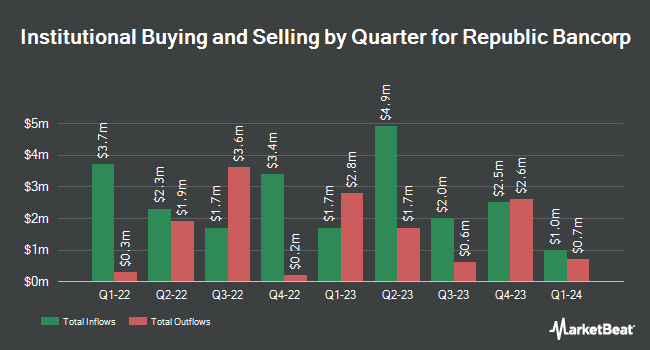Jacobs Levy Equity Management Inc. grew its holdings in shares of Republic Bancorp, Inc. (NASDAQ:RBCAA - Free Report) by 132.4% during the first quarter, according to its most recent filing with the Securities and Exchange Commission. The institutional investor owned 11,935 shares of the bank's stock after purchasing an additional 6,799 shares during the quarter. Jacobs Levy Equity Management Inc. owned about 0.06% of Republic Bancorp worth $762,000 as of its most recent filing with the Securities and Exchange Commission.
A number of other hedge funds and other institutional investors have also modified their holdings of RBCAA. Price T Rowe Associates Inc. MD bought a new position in shares of Republic Bancorp during the 4th quarter valued at $232,000. Northern Trust Corp raised its holdings in shares of Republic Bancorp by 4.3% during the 4th quarter. Northern Trust Corp now owns 85,367 shares of the bank's stock valued at $5,965,000 after purchasing an additional 3,512 shares in the last quarter. Bank of America Corp DE raised its holdings in shares of Republic Bancorp by 35.1% during the 4th quarter. Bank of America Corp DE now owns 10,146 shares of the bank's stock valued at $709,000 after purchasing an additional 2,634 shares in the last quarter. Deutsche Bank AG raised its holdings in shares of Republic Bancorp by 14.4% during the 4th quarter. Deutsche Bank AG now owns 4,676 shares of the bank's stock valued at $327,000 after purchasing an additional 588 shares in the last quarter. Finally, Lazard Asset Management LLC raised its holdings in Republic Bancorp by 41.7% in the 4th quarter. Lazard Asset Management LLC now owns 3,271 shares of the bank's stock worth $228,000 after acquiring an additional 962 shares during the period. Institutional investors own 24.37% of the company's stock.
Analyst Upgrades and Downgrades
Separately, Raymond James Financial assumed coverage on shares of Republic Bancorp in a report on Friday, June 27th. They issued a "market perform" rating on the stock. Two research analysts have rated the stock with a Hold rating, According to data from MarketBeat, the stock presently has a consensus rating of "Hold" and an average price target of $69.00.
Get Our Latest Report on RBCAA
Republic Bancorp Stock Up 3.0%
Shares of Republic Bancorp stock traded up $2.22 on Thursday, hitting $77.31. The company had a trading volume of 22,316 shares, compared to its average volume of 19,189. The firm has a market capitalization of $1.51 billion, a P/E ratio of 12.12 and a beta of 0.58. Republic Bancorp, Inc. has a twelve month low of $56.79 and a twelve month high of $80.68. The company has a debt-to-equity ratio of 0.35, a current ratio of 1.08 and a quick ratio of 1.07. The stock has a 50-day moving average of $73.65 and a 200-day moving average of $70.04.
Republic Bancorp (NASDAQ:RBCAA - Get Free Report) last released its quarterly earnings results on Friday, July 18th. The bank reported $1.61 earnings per share for the quarter, beating the consensus estimate of $1.42 by $0.19. The company had revenue of $93.00 million during the quarter, compared to analysts' expectations of $93.50 million. Republic Bancorp had a net margin of 23.98% and a return on equity of 12.23%.
Republic Bancorp Dividend Announcement
The firm also recently announced a quarterly dividend, which will be paid on Friday, October 17th. Investors of record on Friday, September 19th will be issued a dividend of $0.451 per share. The ex-dividend date is Friday, September 19th. This represents a $1.80 annualized dividend and a yield of 2.3%. Republic Bancorp's dividend payout ratio is presently 28.21%.
Insider Buying and Selling at Republic Bancorp
In related news, EVP Juan Montano sold 1,223 shares of the stock in a transaction on Wednesday, September 3rd. The shares were sold at an average price of $75.53, for a total transaction of $92,373.19. Following the completion of the transaction, the executive vice president owned 4,434 shares in the company, valued at approximately $334,900.02. This represents a 21.62% decrease in their ownership of the stock. The sale was disclosed in a document filed with the SEC, which can be accessed through this hyperlink. Also, EVP Christy Ames sold 400 shares of the stock in a transaction on Monday, September 15th. The stock was sold at an average price of $75.79, for a total transaction of $30,316.00. Following the transaction, the executive vice president owned 4,738 shares of the company's stock, valued at $359,093.02. The trade was a 7.79% decrease in their position. The disclosure for this sale can be found here. Corporate insiders own 56.40% of the company's stock.
About Republic Bancorp
(
Free Report)
Republic Bancorp, Inc operates as a bank holding company for Republic Bank & Trust Company that provides various banking products and services in the United States. It operates in six segments: Traditional Banking, Warehouse, Mortgage Banking, Tax Refund Solutions, Republic Payment Solutions, and Republic Credit Solutions.
Featured Stories

Before you consider Republic Bancorp, you'll want to hear this.
MarketBeat keeps track of Wall Street's top-rated and best performing research analysts and the stocks they recommend to their clients on a daily basis. MarketBeat has identified the five stocks that top analysts are quietly whispering to their clients to buy now before the broader market catches on... and Republic Bancorp wasn't on the list.
While Republic Bancorp currently has a Hold rating among analysts, top-rated analysts believe these five stocks are better buys.
View The Five Stocks Here
Learn the basics of options trading and how to use them to boost returns and manage risk with this free report from MarketBeat. Click the link below to get your free copy.
Get This Free Report
Like this article? Share it with a colleague.
Link copied to clipboard.